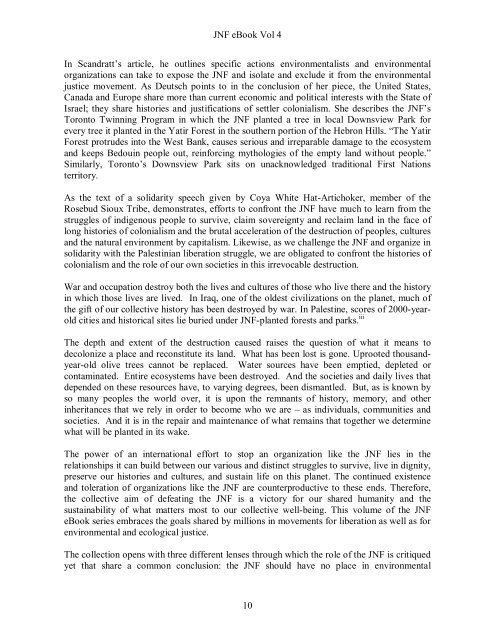JNF eBook Vol 4 - JNF eBook Series
JNF eBook Vol 4 - JNF eBook Series
JNF eBook Vol 4 - JNF eBook Series
Create successful ePaper yourself
Turn your PDF publications into a flip-book with our unique Google optimized e-Paper software.
<strong>JNF</strong> <strong>eBook</strong> <strong>Vol</strong> 4<br />
In Scandratt’s article, he outlines specific actions environmentalists and environmental<br />
organizations can take to expose the <strong>JNF</strong> and isolate and exclude it from the environmental<br />
justice movement. As Deutsch points to in the conclusion of her piece, the United States,<br />
Canada and Europe share more than current economic and political interests with the State of<br />
Israel; they share histories and justifications of settler colonialism. She describes the <strong>JNF</strong>’s<br />
Toronto Twinning Program in which the <strong>JNF</strong> planted a tree in local Downsview Park for<br />
every tree it planted in the Yatir Forest in the southern portion of the Hebron Hills. “The Yatir<br />
Forest protrudes into the West Bank, causes serious and irreparable damage to the ecosystem<br />
and keeps Bedouin people out, reinforcing mythologies of the empty land without people.”<br />
Similarly, Toronto’s Downsview Park sits on unacknowledged traditional First Nations<br />
territory.<br />
As the text of a solidarity speech given by Coya White Hat-Artichoker, member of the<br />
Rosebud Sioux Tribe, demonstrates, efforts to confront the <strong>JNF</strong> have much to learn from the<br />
struggles of indigenous people to survive, claim sovereignty and reclaim land in the face of<br />
long histories of colonialism and the brutal acceleration of the destruction of peoples, cultures<br />
and the natural environment by capitalism. Likewise, as we challenge the <strong>JNF</strong> and organize in<br />
solidarity with the Palestinian liberation struggle, we are obligated to confront the histories of<br />
colonialism and the role of our own societies in this irrevocable destruction.<br />
War and occupation destroy both the lives and cultures of those who live there and the history<br />
in which those lives are lived. In Iraq, one of the oldest civilizations on the planet, much of<br />
the gift of our collective history has been destroyed by war. In Palestine, scores of 2000-yearold<br />
cities and historical sites lie buried under <strong>JNF</strong>-planted forests and parks. iii<br />
The depth and extent of the destruction caused raises the question of what it means to<br />
decolonize a place and reconstitute its land. What has been lost is gone. Uprooted thousandyear-old<br />
olive trees cannot be replaced. Water sources have been emptied, depleted or<br />
contaminated. Entire ecosystems have been destroyed. And the societies and daily lives that<br />
depended on these resources have, to varying degrees, been dismantled. But, as is known by<br />
so many peoples the world over, it is upon the remnants of history, memory, and other<br />
inheritances that we rely in order to become who we are – as individuals, communities and<br />
societies. And it is in the repair and maintenance of what remains that together we determine<br />
what will be planted in its wake.<br />
The power of an international effort to stop an organization like the <strong>JNF</strong> lies in the<br />
relationships it can build between our various and distinct struggles to survive, live in dignity,<br />
preserve our histories and cultures, and sustain life on this planet. The continued existence<br />
and toleration of organizations like the <strong>JNF</strong> are counterproductive to these ends. Therefore,<br />
the collective aim of defeating the <strong>JNF</strong> is a victory for our shared humanity and the<br />
sustainability of what matters most to our collective well-being. This volume of the <strong>JNF</strong><br />
<strong>eBook</strong> series embraces the goals shared by millions in movements for liberation as well as for<br />
environmental and ecological justice.<br />
The collection opens with three different lenses through which the role of the <strong>JNF</strong> is critiqued<br />
yet that share a common conclusion: the <strong>JNF</strong> should have no place in environmental<br />
10


